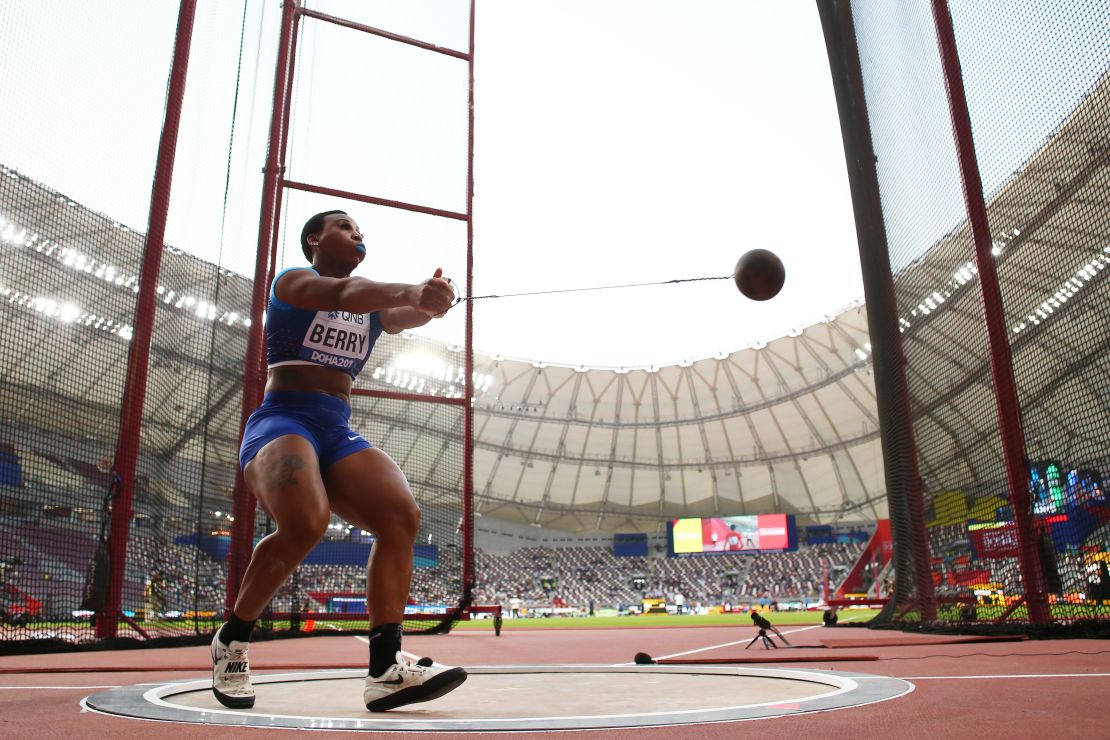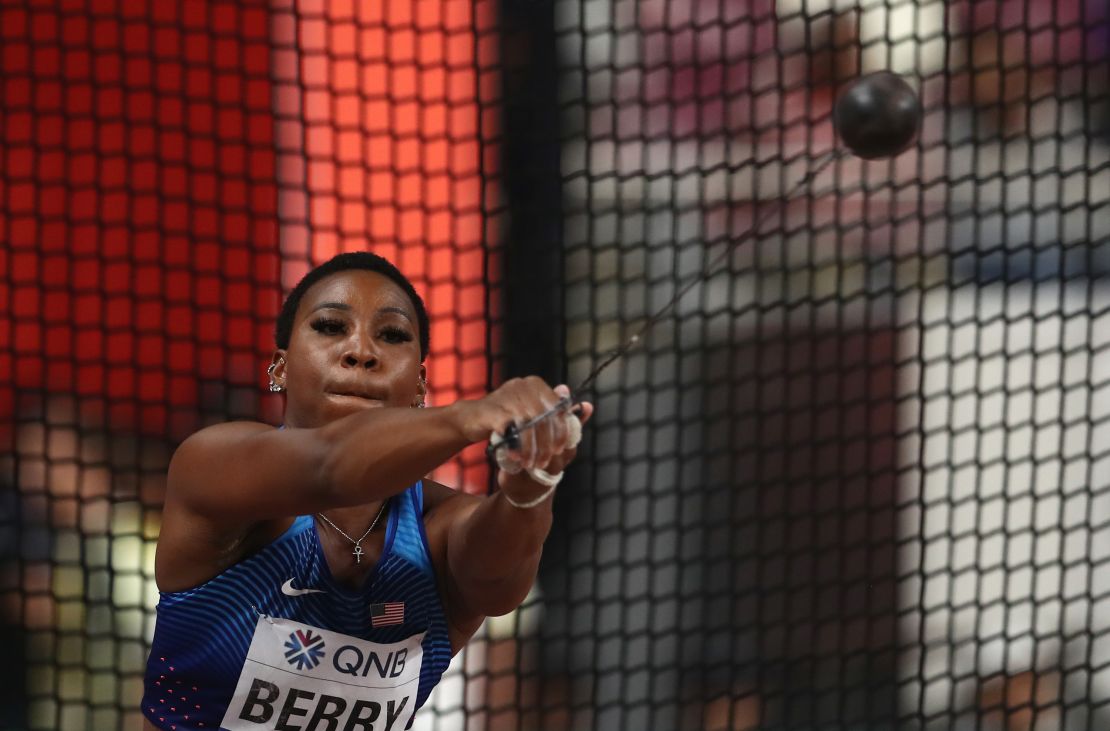Like many Americans around the country, Gwen Berry is weighing her financial options.
She is thinking about filing for unemployment, or seeing if she can get a day job, like the one she once held at Dick’s Sporting Goods, to help stem the financial tide left behind by the coronavirus.
But unlike Americans, Berry is weighing these options as an Olympic athlete.
“When people think of Olympians, they think of people who have a lot of money, like professional basketball players, or professional baseball players, and it’s definitely not the case,” Berry told CNN Sport.
“The Olympics are considered amateur. We do not get paid for training or participating. The Olympic Games makes billions of dollars, and the athletes literally get paid nothing. I don’t think a lot of people understand that, because they don’t know Olympians.
“They think we have this celebrity status but it’s not true. Only 1%, and maybe not even that, generate a decent income. The rest of us don’t.”
READ: Gymnast Simone Biles calls Olympic postponement the ‘right decision’

‘Extremely devastating’
The decision to postpone the Olympics to the summer of 2021 is the worst case scenario for Berry.
A 2016 Olympian in hammer throw, Berry lost some of her sponsorships last year, after raising her fist in protest on the podium of the Pan American games.
She received a 12-month probation from the US Olympic and Paralympic Committee for the act, which she says was meant to highlight social injustice in America.
The IOC’s decision to postpone the Olympics by a year, means the rest of her sponsorship dollars are now gone too. Unlike the global roster of Olympians who have had their Olympic sponsorships extended by companies like Visa, Berry is very much on her own.
“For me it was extremely devastating because they cut off all my revenue. Competing, going overseas, going to competitions, getting prize money, and then ultimately making the Olympic team help me, help my family, help my community,” the 30-year-old explains.
“For a lot of Paralympians and Olympians, when you have this opportunity and it’s taken from you – everything gets cut.
Mental health issues
“Most companies sponsor you or support you because of the Olympics. It’s one of the biggest sporting events in the world. So I think for most people that’s been the hardest thing is the financial support and the financial stability.
“It’s just been really hard for people to get out there and train and even find the motivation to continue at this time.”
The financial burden is only one of the challenges facing hundreds of athletes who thrive in a meticulously disciplined lifestyle.
“The mental health situation for most athletes is really dire. For professional athletes, we’re pretty intense,” she outlines. “We have a regimen and we want to stick to it.
READ: The breast cancer survivor determined to make her fifth Olympic Games in 2021
“We focus on being excellent every single day, so when all of that stops it really feels like retirement – like what do I do now? What do I do next
“If I can’t practice on that or focus on this, what do I do? Our schedule is interrupted, our regimen is interrupted, our eating habits, our exercise habits, everything is terribly interrupted, so I feel like it can make a lot of people kind of go crazy and kind of feel just like ‘What do I do?’
“I know that USA Track and Field has done a really good job emailing us and letting us know that if we do need mental help and we do need to call in, that we have that service provided to us.
“I don’t want to say Olympians have it worse that everyone who is struggling, but emotionally, it could be worse, because we have sacrificed years.
“This has literally stopped everything for us. It stops everything relating to our goals, our dreams, our families, and we already get paid nothing anyway. So it’s nothing on top of nothing on top of nothing, for this moment that we may not even get anymore.”

An uncertain future
Berry isn’t sure yet whether this setback marks the end of her Olympic journey. She has a 15-year-old son named Derrick, who lives with his father in her hometown of St. Louis.
Since leaving for college in 2007, she has had to miss much of Derrick’s life while chasing her Olympic dream. She is not sure she wants to miss any more of it.
“My child plays a very big part in this. I have been away from him for a long time. I’ve always had to train outside of St. Louis and I only get to go home a few times a year to visit him. He is going to college soon, and I want to be a part of that. More a part of it than I am now,” Berry said.
“I think the decision for 2021 will come down to my family. Before I moved out here to Texas to train two years ago, I went home to St. Louis and I consulted with my family, so hopefully I will get to go home pretty soon, I don’t know the travel restrictions from Texas to Missouri, and I’ll talk to my family again and see how they feel about everything and see how they feel about me being away and then I’ll go from there.”

There is also the race against the clock. The daily strain track and field athletes put on their bodies is immense.
“I feel like even though I do love the sport, I am getting older. My body changes everyday. Every practice, something else hurts.
“At this time I feel like it’s just up in the air. I’ll let my body decide what I should do, my family, and I’ll keep trying my best to train and do what I can right now. It will come down to my body and the way it responds to training, and the time being away from my family. “
It as while working her way towards the 2016 Olympic Games in Rio, that Berry got a job for year at Dick’s Sporting Goods to ease financial strain.
Visit CNN.com/sport for more news, features, and videos
She is considering doing the same thing now, but tells CNN that a lot of those places aren’t hiring in Houston, where she has lived and trained the last two years.
“I really want to file for unemployment, because honestly this is affecting my income. Luckily, I do have some savings, I do have enough to help me and my family from afar, but honestly I was thinking about filing for unemployment because essentially I am unemployed.”
That’s a reality facing thousands across the US.


















